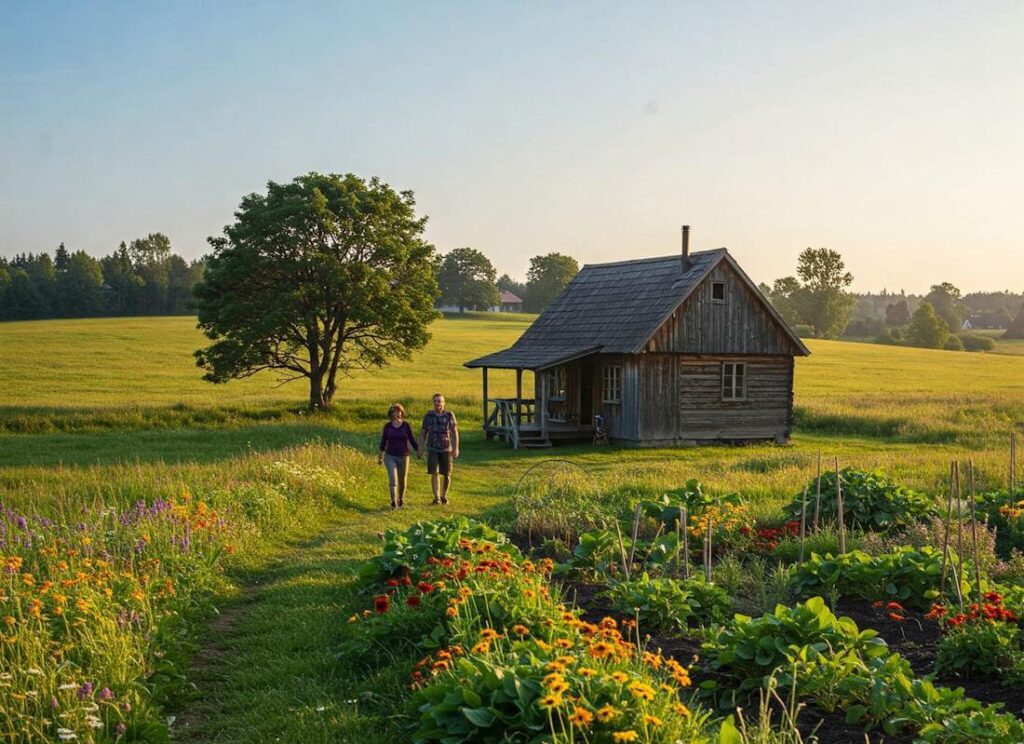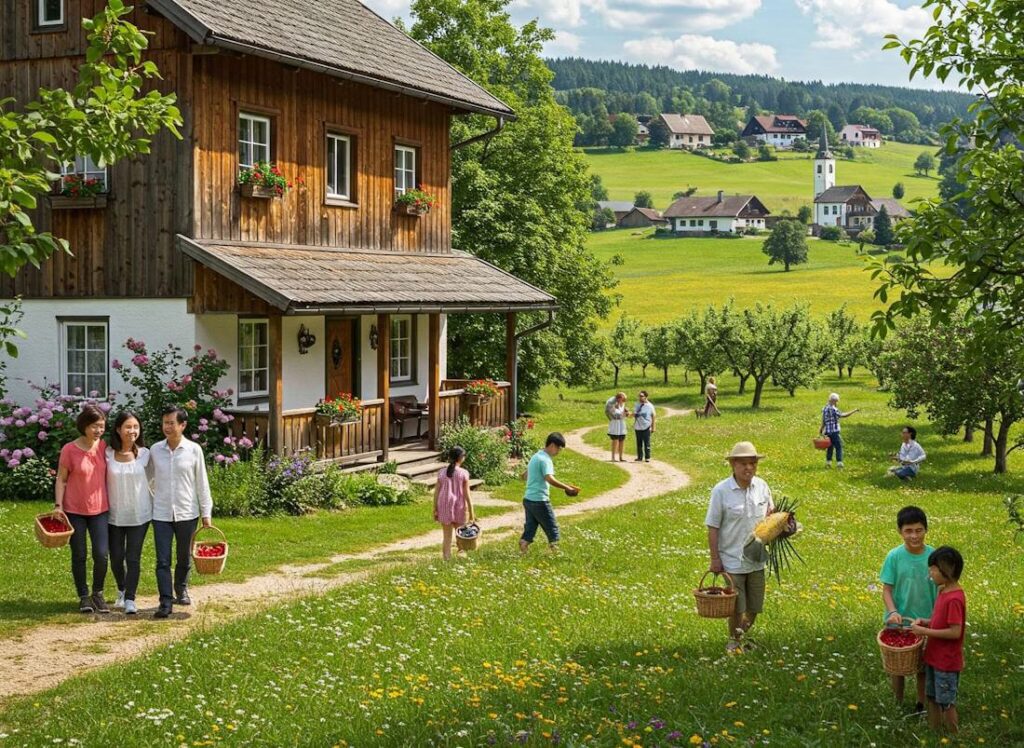Rural tourism refers to travel experiences that take place in non-urban, countryside areas, where tourists engage with the local environment, culture, and community. This form of tourism has gained significant traction in recent years, as more individuals choose to explore nature and escape the hustle and bustle of city life. The allure of the countryside, with its stunning landscapes, fresh air, and tranquil surroundings, draws people seeking relaxation and adventure alike. Consequently, rural tourism is becoming an increasingly vital sector within the global economy.
One of the key benefits of rural tourism is the opportunity for people to reconnect with nature. As urbanization expands, many individuals become disconnected from natural environments, leading to a growing desire to experience outdoor activities such as hiking, birdwatching, and camping. Engaging in these pursuits not only enhances well-being but also fosters a deeper appreciation for biodiversity and sustainable practices. The increasing demand for such experiences highlights the unique position of rural areas to capitalize on this trend, offering curated experiences that cater to nature enthusiasts.
Additionally, turning a passion for nature into a profitable business opportunity has become more accessible than ever. Entrepreneurs can create ventures such as eco-lodges, guided nature tours, and farm-to-table restaurants that celebrate local produce and landscapes. Not only do these businesses provide economic benefits for rural communities, but they also contribute to the preservation of natural resources and cultural heritage. By harnessing their love for the outdoors, individuals can develop sustainable business models that thrive while promoting environmental stewardship. This aligns both with personal passions and the increasing societal shift towards responsible tourism practices.
Identifying Your Niche in Nature Tourism
Identifying a niche in nature tourism is crucial for aspiring entrepreneurs aiming to create a successful rural tourism business. Nature tourism encompasses a broad range of activities, so pinpointing a specific niche allows for targeted marketing and personalized offerings. This process begins with a thorough self-assessment of one’s interests and skills as well as an evaluation of the natural resources available in the region.
One popular niche within nature tourism is eco-tourism, which emphasizes sustainability and responsible travel practices. Eco-tourism often attracts environmentally-conscious travelers who wish to immerse themselves in nature while minimizing their impact. Offering guided nature hikes or workshops on local flora and fauna could appeal to this market. Another lucrative opportunity lies in adventure tourism. This niche caters to thrill-seekers eager for adrenaline-filled activities such as zip-lining, kayaking, or rock climbing, appealing to those in search of unique experiences in nature.
Wellness retreats have gained significant traction in recent years, focusing on mental and physical wellbeing through nature-based activities. Structures such as yoga classes amidst natural landscapes or guided meditation sessions can provide a serene experience for visitors seeking relaxation. Additionally, educational tours present another avenue, highlighting regional wildlife, ecosystems, or cultural heritage. Such tours can attract families, schools, and other groups keen on learning while connecting with nature.
To carve out a unique business offering, one must consider the intersection of personal interests and regional resources. Conducting market research to identify competitors and potential customers can help tailor services to meet demand. By understanding one’s strengths and local opportunities, entrepreneurs can successfully navigate the competitive landscape of nature tourism, ultimately establishing a rewarding business that reflects their passion for the great outdoors.
Researching Your Target Market
Understanding your target market is a foundational step in establishing a successful rural tourism business. By gaining insights into the demographics, preferences, and behaviors of potential customers, you can tailor your offerings to better meet their needs. One effective strategy for conducting market research is through surveys. These can be distributed online or in person and should include questions that cover various aspects, such as preferred activities, budget ranges, and travel motivations. The data collected from these surveys will help create a clear picture of what attracts visitors to rural areas.
Focus groups are another valuable tool for understanding your target market. By gathering a small, diverse group of potential customers and facilitating a discussion about their experiences and expectations related to rural tourism, you can uncover insights that surveys might not reveal. Focus groups allow for nuanced discussions, where participants can share their opinions and justifications behind their preferences, providing deeper understanding of the customer psyche.
Online analytics are also crucial in researching your target audience. Social media platforms and website analytics can offer a wealth of information regarding user behavior and interests. By analyzing which posts engage your audience the most or which pages on your website attract the most visits, you can refine your marketing strategies effectively. Look for patterns in engagement to identify segments of your audience that are particularly interested in specific aspects of rural tourism, such as eco-tourism, adventure sports, or cultural experiences.
Additionally, following industry trends through reports and publications related to rural tourism will give you a broader understanding of market dynamics. By leveraging these strategies collectively, you will be well-equipped to make informed decisions that resonate with your target market and enhance the profitability of your rural tourism business.
Creating a Business Plan
Developing a robust business plan is an essential step for anyone looking to transform their passion for nature into a successful rural tourism business. The first component of a solid business plan is defining clear business goals. These goals should not only reflect the vision and mission of the venture but also be specific, measurable, attainable, relevant, and time-bound (SMART). Establishing such goals lays the foundation for all future decisions and actions.
Next, a comprehensive SWOT analysis is vital. This analysis involves assessing the Strengths, Weaknesses, Opportunities, and Threats related to the rural tourism venture. Identifying strengths, such as unique natural features or local expertise, can help in crafting a compelling market position. Conversely, recognizing weaknesses allows for proactive strategies to minimize potential shortcomings. Furthermore, exploring opportunities in rural tourism, such as emerging travel trends or partnership possibilities, can offer significant advantages. Lastly, acknowledging external threats, like competition or environmental factors, prepares the business for challenges.
Budgeting is another critical component. A detailed budget should account for both initial startup costs, such as property acquisition and marketing expenses, and ongoing operational expenses. This financial forecast helps ensure that the business remains viable and sustainable in the long run. Additionally, effective marketing strategies tailored for the rural tourism market are crucial. Understanding the target audience, leveraging social media, and utilizing local networks can significantly enhance visibility and attract visitors.
Operational plans should also be detailed within the business plan. These plans encompass the day-to-day management of the business, including staffing, customer service protocols, and resource management. Establishing realistic expectations and timelines is paramount, as these will guide the implementation of the business strategy and help in assessing progress towards achieving the defined goals.
Developing Unique Experiences and Offerings
Creating a profitable rural tourism business centered around nature requires the design of unique experiences that capture the essence of the natural landscape. The key to attracting visitors lies in offering activities that not only showcase the beauty of the surroundings but also engage potential travelers in meaningful ways. Guided hikes, for instance, can provide profound insights into local flora and fauna, unraveling the secrets of the ecosystem while allowing guests to connect with nature closely.
Horseback riding is another captivating option that affords tourists a unique perspective of the rural landscape. This form of adventure not only promotes relaxation but also encourages exploration of areas that may be less accessible on foot. Providing well-trained horses and experienced guides will ensure that guests have a safe and enjoyable experience, enhancing their appreciation for the expansive nature that surrounds them.
For those with a passion for photography, nature photography workshops can serve as an excellent offering. Participants can learn techniques from professionals while capturing breathtaking views, thus forging a connection with the environment that they can carry home through their art. Engaging local photographers who are familiar with the region’s hidden gems may further personalize this experience.
Additionally, incorporating local culinary experiences adds a rich dimension to the tourism offerings. Providing opportunities for visitors to enjoy meals prepared with fresh, locally sourced ingredients can enhance their connection to the rural lifestyle. Cooking classes that teach traditional recipes can further allow tourists to immerse themselves in the local culture, supporting local farmers and fostering community relationships.
Through the careful development of these unique experiences, rural tourism businesses can create memorable and authentic journeys that resonate with nature enthusiasts. This commitment to showcasing the beauty of rural environments not only attracts visitors but also cultivates a deeper appreciation for the natural world.
Marketing Your Rural Tourism Business
In the ever-evolving landscape of tourism, effective marketing strategies are essential for promoting a rural tourism business. A multifaceted approach that blends online and offline methods can significantly enhance visibility and attract potential customers to your venture. The first step is to develop a strong online presence; this begins with creating an engaging website that showcases the unique aspects of your offerings. Ensure that the site is user-friendly, visually appealing, and contains comprehensive information about the services provided, including accommodation, local attractions, and any special experiences available.
Search engine optimization (SEO) plays a crucial role in attracting organic traffic to your website. By utilizing relevant keywords related to rural tourism, including phrases that potential customers are likely to search for, your site can rank higher in search engine results. Consider producing high-quality content that resonates with your target audience; this may include blog posts about local flora and fauna, sustainable travel tips, or testimonials from previous visitors. Implementing a content marketing strategy will keep your audience engaged and encourage them to share their experiences online.
Social media marketing is another vital tool for promoting your rural tourism business. Platforms such as Instagram, Facebook, and Twitter can be used to showcase captivating images and stories about your location and activities. Engaging with your audience through regular posts and responding to comments fosters a sense of community and builds brand loyalty. Furthermore, partnering with local organizations, such as tourism boards or conservation groups, can extend your reach and provide additional marketing opportunities.
Finally, attending trade shows and local events can help network with other professionals and gain insights into industry trends. Such interactions can also lead to potential collaborations, which enhance your marketing efforts. By applying a combination of these strategies, rural tourism businesses can effectively attract visitors, thus turning their passion for nature into a profitable endeavor.
Building Relationships with the Community
Establishing a successful rural tourism business hinges significantly on forging strong relationships with the local community and its stakeholders. These connections not only enhance your business’s credibility but also create a supportive environment where all parties can thrive. Engaging with local businesses is a key strategy. Consider forming alliances with nearby farms, artisans, restaurants, and lodging providers to offer a more enriched experience for your visitors. Such collaborations can lead to cross-promotional opportunities, driving traffic to all partners involved. For instance, a local farm may benefit from increased sales if your tours include visits to their land, and your guests may appreciate sampling local produce.
Networking within the community also plays a crucial role in building trust and rapport. Attend local meetings, join local business associations, or participate in community events to introduce yourself and your venture. Demonstrating genuine interest in community affairs can lead to fruitful dialogues and partnerships. When local stakeholders see your commitment to the area, they are more likely to support your initiatives, recommend your services, and actively participate in promoting your tourism offerings.
Contributing to the local economy strengthens these relationships further. Consider sourcing materials and services locally, which not only supports fellow community members but also enriches your business’s authenticity. When local people feel empowered by your presence, they are often willing to spread the word about your enterprise. By ensuring that your tourism business aligns with community interests and values, you will help cultivate an inviting atmosphere for tourists and create a sustainable operation that benefits everyone. These collaborative efforts ultimately contribute to a vibrant ecosystem that recognizes and celebrates the unique aspects of rural life.
Understanding Regulations and Compliance
When embarking on the journey to establish a rural tourism business, it is imperative for entrepreneurs to grasp the various regulations and compliance issues that could influence their operations. The legal landscape can be complex; thus, familiarizing oneself with essential permits, licenses, safety standards, and zoning laws is crucial for ensuring a successful venture.
First and foremost, obtaining the right permits and licenses is a fundamental step. Typically, this includes a business license, which is often required at the local level. Depending on the specific nature of the rural tourism activities—be it guided tours, accommodations, or recreational services—additional permits may be necessary. These could range from health permits related to food service to special permits that govern land use, particularly in areas designated for conservation or agriculture.
Safety standards also play a critical role in compliance. Aspects such as visitor safety, sanitation, and emergency protocols need to be outlined and adhered to. For instance, if the business involves outdoor activities like hiking or kayaking, implementing safety measures and ensuring adequate insurance coverage are paramount. Establishing protocols not only protects the clients but also shields the business from potential liabilities.
Zoning laws further dictate the feasibility of certain operations based on geographic areas. Entrepreneurs must assess whether their intended business location falls within permitted zones for rural tourism activities. Engaging with local planning authorities can provide insight into zoning classifications, ensuring that the planned operations align with local regulations.
In conclusion, grasping the intricacies of regulations and compliance is vital for anyone looking to start a rural tourism business. By diligently navigating the necessary permits, licenses, safety standards, and zoning laws, entrepreneurs can improve their prospects for success while fostering responsible and sustainable tourism in rural areas.
Sustainable Practices in Rural Tourism
As the rural tourism industry continues to grow, the significance of incorporating sustainable practices has become increasingly paramount. By prioritizing sustainability, rural tourism businesses can not only attract eco-conscious travelers but also mitigate the environmental impact that tourism can impose on delicate ecosystems. Implementing eco-friendly practices is essential for fostering a more sustainable future in rural areas.
One effective strategy for promoting sustainability is adopting practices that minimize waste and conserve resources. This may involve the use of renewable energy sources, such as solar panels, to power accommodations and facilities. Additionally, optimizing water usage through rainwater harvesting and using energy-efficient appliances can significantly reduce the overall environmental footprint. Rural tourism operators should also focus on sourcing local produce and goods to support the economy and decrease carbon emissions associated with transportation.
Engaging tourists in conservation efforts is another critical aspect of sustainable rural tourism. This can be achieved through organized activities such as wildlife watching, guided nature walks, and volunteer opportunities for reforestation or habitat restoration projects. By actively involving guests in these initiatives, businesses can foster a deeper understanding of environmental stewardship while enhancing their overall experience. Furthermore, educational programs that raise awareness about local ecosystems and biodiversity can help guests appreciate the importance of preserving these natural habitats.
The long-term benefits of implementing sustainable practices in rural tourism are significant for both the environment and the business. Sustainable tourism can lead to a healthier ecosystem, ensuring that natural resources remain intact for future generations to enjoy. Moreover, businesses that embrace sustainability may also experience increased customer loyalty, as travelers increasingly seek out eco-friendly options. This comprehensive approach not only strengthens the tourist experience but also contributes to the overall resilience of rural tourism in a changing world.



